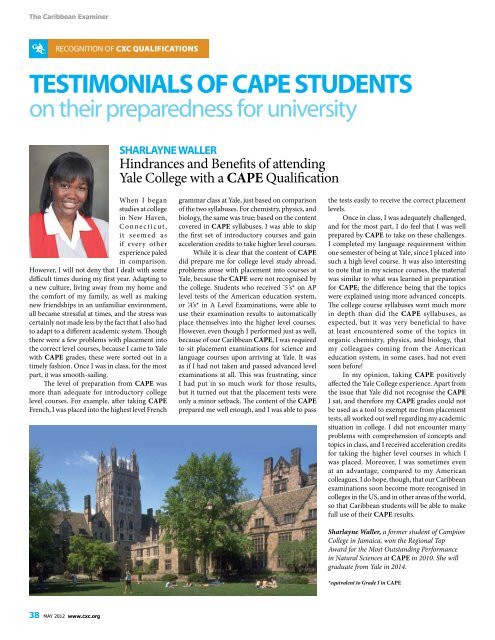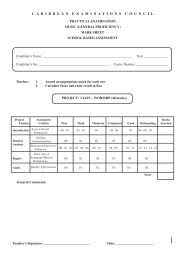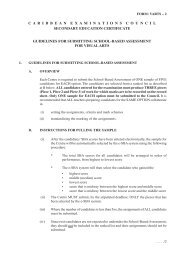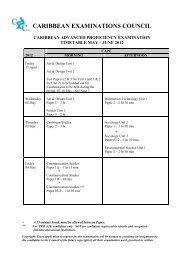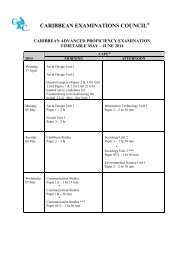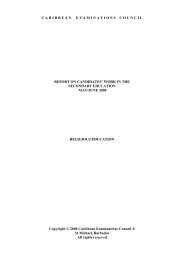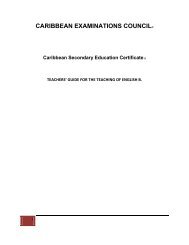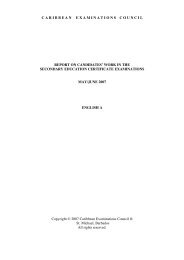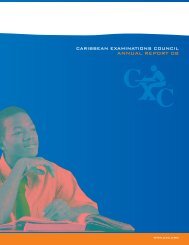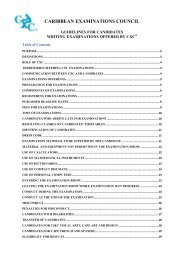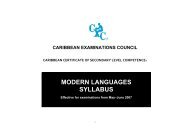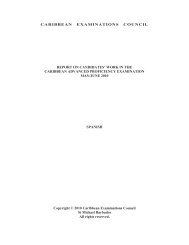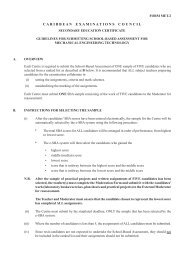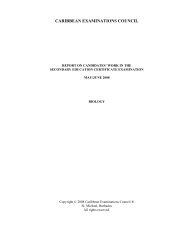The <strong>Caribbean</strong> <strong>Examiner</strong>RECOGNITION OF <strong>CXC</strong> QUALIFICATIONSTestimonials of CAPE studentson their preparedness for universitySharlayne WallerHindrances and Benefits of attendingYale College with a CAPE QualificationWhen I beganstudies at collegein New Haven,C on n e c t i c ut ,it s e e med asif every otherexperience paledin comparison.However, I will not deny that I dealt with somedifficult times during my first year. Adapting toa new culture, living away from my home andthe comfort of my family, as well as makingnew friendships in an unfamiliar environment,all became stressful at times, and the stress wascertainly not made less by the fact that I also hadto adapt to a different academic system. Thoughthere were a few problems with placement intothe correct level courses, because I came to Yalewith CAPE grades, these were sorted out in atimely fashion. Once I was in class, for the mostpart, it was smooth-sailing.The level of preparation from CAPE wasmore than adequate for introductory collegelevel courses. For example, after taking CAPEFrench, I was placed into the highest level Frenchgrammar class at Yale, just based on comparisonof the two syllabuses. For chemistry, physics, andbiology, the same was true; based on the contentcovered in CAPE syllabuses, I was able to skipthe first set of introductory courses and gainacceleration credits to take higher level courses.While it is clear that the content of CAPEdid prepare me for college level study abroad,problems arose with placement into courses atYale, because the CAPE were not recognised bythe college. Students who received ‘5’s* on APlevel tests of the American education system,or ‘A’s* in A Level <strong>Examinations</strong>, were able touse their examination results to automaticallyplace themselves into the higher level courses.However, even though I performed just as well,because of our <strong>Caribbean</strong> CAPE, I was requiredto sit placement examinations for science andlanguage courses upon arriving at Yale. It wasas if I had not taken and passed advanced levelexaminations at all. This was frustrating, sinceI had put in so much work for those results,but it turned out that the placement tests wereonly a minor setback. The content of the CAPEprepared me well enough, and I was able to passthe tests easily to receive the correct placementlevels.Once in class, I was adequately challenged,and for the most part, I do feel that I was wellprepared by CAPE to take on these challenges.I completed my language requirement withinone semester of being at Yale, since I placed intosuch a high level course. It was also interestingto note that in my science courses, the materialwas similar to what was learned in preparationfor CAPE; the difference being that the topicswere explained using more advanced concepts.The college course syllabuses went much morein depth than did the CAPE syllabuses, asexpected, but it was very beneficial to haveat least encountered some of the topics inorganic chemistry, physics, and biology, thatmy colleagues coming from the Americaneducation system, in some cases, had not evenseen before!In my opinion, taking CAPE positivelyaffected the Yale College experience. Apart fromthe issue that Yale did not recognise the CAPEI sat, and therefore my CAPE grades could notbe used as a tool to exempt me from placementtests, all worked out well regarding my academicsituation in college. I did not encounter manyproblems with comprehension of concepts andtopics in class, and I received acceleration creditsfor taking the higher level courses in which Iwas placed. Moreover, I was sometimes evenat an advantage, compared to my Americancolleagues. I do hope, though, that our <strong>Caribbean</strong>examinations soon become more recognised incolleges in the US, and in other areas of the world,so that <strong>Caribbean</strong> students will be able to makefull use of their CAPE results.Sharlayne Waller, a former student of CampionCollege in Jamaica, won the Regional TopAward for the Most Outstanding Performancein Natural Sciences at CAPE in 2010. She willgraduate from Yale in 2014.*equivalent to Grade I in CAPE38 MAY <strong>2012</strong> www.cxc.org
The <strong>Caribbean</strong> <strong>Examiner</strong>JENNISA NANDOOThe Rigour of CAPE paid off at LSECAPE Students’ TestimonialsAdmittedly, afterthe hype of beingadmitted to sucha prestigiousinstitution likethe LSE to studyInternationalRelations haddied down, Iwas assaulted by an attack of nerves and panic,wondering if my secondary school education,and in particular, my CAPE preparation,would leave me at a gross disadvantage to otherstudents coming from different institutionalbackgrounds. Indeed, the LSE, which boastsstudents from more than 150 countries, takes inthe crème de la crème of students from differentinternationally recognised examinations such asthe International Baccalaureat, A-Levels, SATsand French Baccalaureat. As CAPE was generallya more recent examination system, I could nothelp but feel intimidated by my new peers, evenbefore classes had actually begun!However, on my first meeting with myacademic advisor who is a lecturer at the LSE, myfears were greatly alleviated when he remarkedthat he had looked through my academic recordand was quite impressed with my achievements.I breathed a sigh of relief, thinking that if a topnotchlecturer who deals with so many studentsfrom so many different academic backgroundscould be impressed by my CAPE qualifications,then maybe I wasn’t on such a bad footing afterall vis-à-vis my future classmates.Yet it was truly in the classroom that myfears were firmly laid to rest. I realised that CAPEwas more than just an examination, that CAPEis a system, designed to encourage studentsto function at maximum efficiency, givingmaximum results. In my French and Spanishclasses, I found that the rigorous teaching andtraining that I had received in Sixth Form andthe demands of the CAPE Foreign Languagesyllabi meant that I easily outperformed myclassmates in many areas, or even matched thestandards of those who had spent a substantialamount of time in France or Spain, or who wereeven French or Spanish by nationality. Clearly,this was no small feat.Even in my other courses where a sharp,critical mind was required to analyse the worldaround us, and the changing lands CAPEof international relations, I found that theknowledge of History that I had gained fromCAPE greatly aided my understanding andappreciation of course materials. What I hadthought was an overloaded syllabus when Iwas in Sixth Form, turned out to be a blessingin disguise, especially as in my first year at theLSE, I had to take a history course which coveredtopics that I had already mastered in my CAPEexaminations. Furthermore, the countless hoursspent in researching and preparing IAs for myforeign language subjects, for History and for<strong>Caribbean</strong> and Communication Studies madea huge difference to my research ethic whenconducting obligatory research assignmentsof my own at the LSE. Special mention mustbe made of my History IA and the researchmethods classes of <strong>Caribbean</strong> Studies whichhave truly proven to be worth their weight ingold. The communicative skills taught in theCommunication Studies syllabus also provedimmensely helpful as I delivered my obligatoryclass presentations, receiving consistently highmarks for my presentation style and content.Lastly, it is an undeniable fact that to surviveand succeed at CAPE, one has to master timemanagement and this taught me invaluablelessons which continue up to today to affectmy time at the LSE. I learnt how to manage myacademic priorities, with my social and extracurricularlife and I have adapted these lessonsto my survival in London. Indeed, CAPE taughtme how to cope successfully with a challengingenvironment, and a challenging environmentcertainly characterises what I found myself upagainst when I commenced my studies at theLSE. In fact, this is a lesson for life especiallyas the world of work becomes more and morecompetitive and demanding.Given these life-long lessons that I acquiredduring CAPE, I realised on reflection that I wasnever at a disadvantage to the other students atthe LSE. In fact, I was just as good, or even betterin some respects, and for this I am truly grateful.There is nothing sweeter than being confident inone’s knowledge and in one’s ability to do one’swork well. The rigours of CAPE helped me tostand secure in this confidence in a world ofacademic elite, where it is an accepted ethos thathard work truly pays off. Now, as I am aboutto leave the hallowed halls of LSE, I know for afact, that had I not mastered the strategies andknowledge imparted by the CAPE system, thenI would not have been able to survive the past 3years. Therefore, it is to this system that I owe asubstantial part of my gratitude.Jennisa Nandoo won the Regional Top Awardfor the Most Outstanding Performance inModern Languages in 2008. She is a formerstudent of Naparima Girls’ High School,Trinidad and Tobago. Jennisa is graduating fromLSE in <strong>2012</strong>.www.cxc.org MAY <strong>2012</strong> 39


